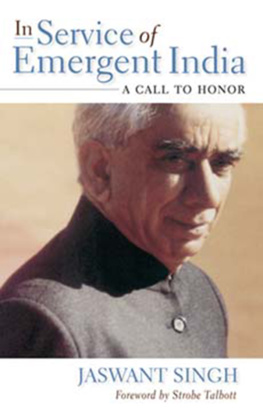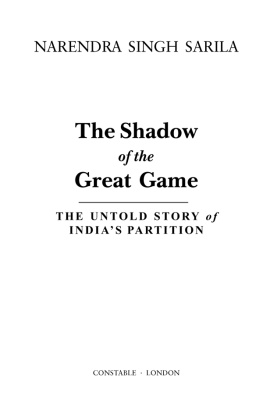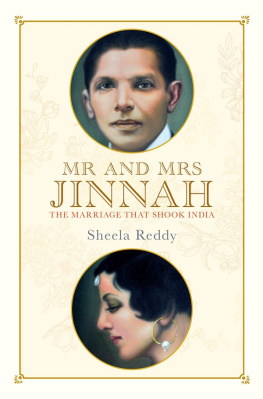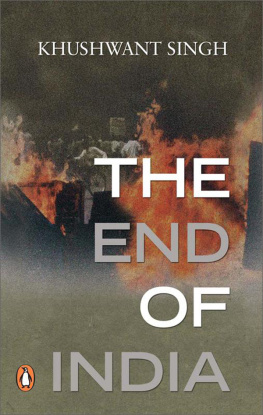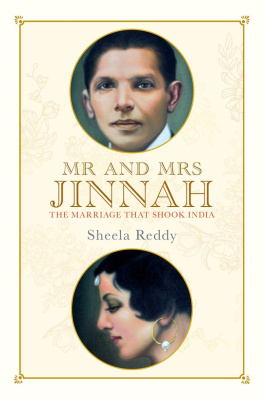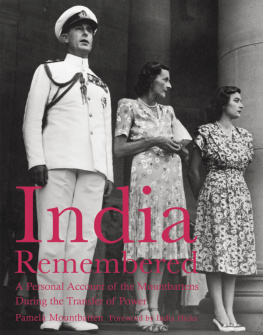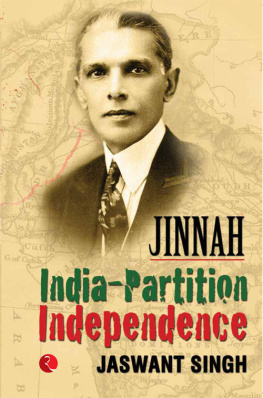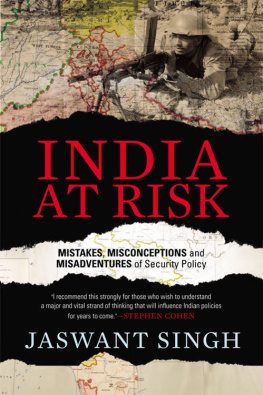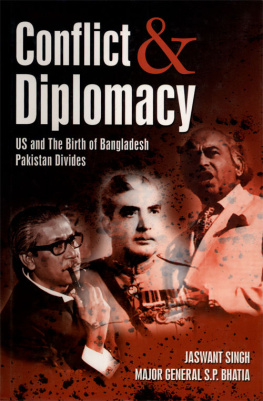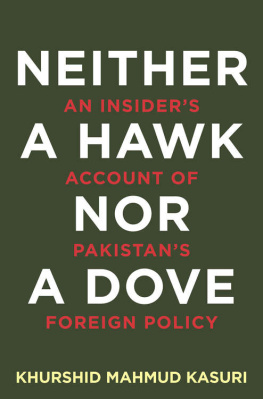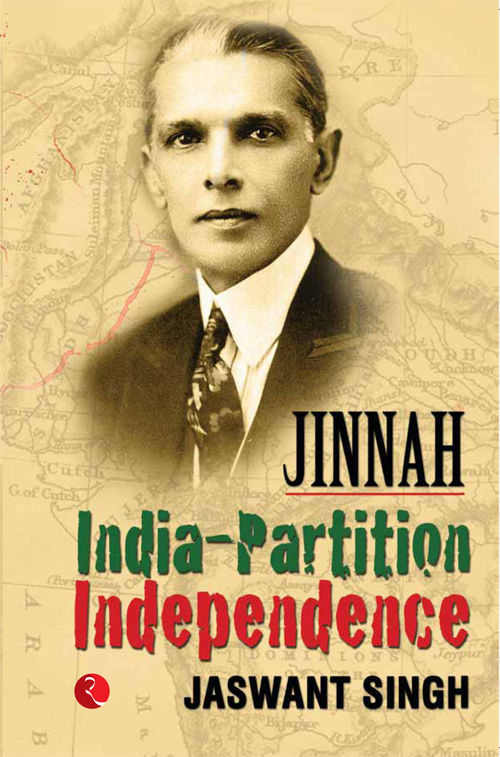
JINNAH
INDIA PARTITION INDEPENDENCE
JINNAH
INDIA PARTITION INDEPENDENCE
JASWANT SINGH

First published in 2009 by
Rupa Publications India Pvt. Ltd.
7/16, Ansari Road, Daryaganj
New Delhi 110002
Sales centres:
Allahabad Bengaluru Chennai
Hyderabad Jaipur Kathmandu
Kolkata Mumbai
Copyright Jaswant Singh 2009
Cover design: peali.
The views and opinions expressed in this book are the authors own and the facts are as reported by him/her which have been verified to the extent possible, and the publishers are not in any way liable for the same.
This digital edition published in 2012
e-ISBN: 978-81-291-2014-4
Jaswant Singh asserts the moral right to be identified as the author of this work.
Digital edition prepared by Ninestars Information Technologies Ltd.
All rights reserved.
This e-book is sold subject to the condition that it shall not, by way of trade or otherwise, be lent, resold, hired out, or otherwise circulated, without the publishers prior consent, in any form or cover other than that in which it is published. No part of this publication may be reproduced, transmitted, or stored in a retrieval system, in any form or by any means, whether electronic, mechanical, print reproduction, recording or otherwise, without the prior permission of the publisher. Any unauthorized distribution of this e-book may be considered a direct infringement of copyright and those responsible may be liable in law accordingly.
To those that lost their all in the partition
.Dawn was theirs,
And sunset and the colours of the earth .
RUPERT BROOKE ; The Dead
CONTENTS
LIST OF ILLUSTRATIONS
- An elegant Jinnah
- Jinnah relaxing
- Barrister Jinnah
- Jinnah, H.J. Rustomjee and Homi Rustomjee
- Meeting of the Indian National Congress and All India Muslim League
- Jinnah with his Doberman and West Highland Terrier
- Jinnah with daughter Dina
- Jinnah with sister Fatima and daughter Dina
- Muslim League leaders
- Round Table Conference, London, 1931
- Jinnah with Subhas Bose
- All India Muslim League, 26th Session
- At 10 Aurangzeb Lane, 194445
- Reception at India House
- Jinnah arriving in Karachi
- Quaid-e-Azam Jinnah at opening of the State Bank of Pakistan
- At Quetta Railway Station, 1945
- With Louis Fischer
- With Muslim League Women's Guard
- With sister Fatima
- Jinnah in his study
- Jinnah in Jodhpur breeches
- As Barrister at Law (top and bottom)
- On holiday (top and bottom)
- Quaid-e-Azam Governor-General Mohammed Ali Jinnah
ACKNOWLEDGEMENTS
My quest for writing a political biography of Mohammed Ali Jinnah goes back a long way, but really as a thought, the seed of the idea lying dormant for many years, certainly until 1999, when fortuitous circumstances made its planting possible. This was during Prime Minister Atal Behari Vajpayees historical bus journey to Lahore in 1999. I accompanied the prime minister to Minar-e-Pakistan, (It is a 60-metre high tower to mark the place where the All India Muslim League adopted a resolution for the creation of Pakistan on 23 March 1940) returning from where I was struck by the thought there existed no biography of Jinnah written by a political figure from India. It was then that I decided to fill the gap; however, yet again, between that thought and subsequent action, the gap lengthened.
It was only in 2004 when a processing of this work actually began. It was the period when I was out of office and had a fair amount of time to reflect, to research and to write.
It is then that my first consultations also started; a large number of those whom I spoke with wondered why I was venturing on this path at all and as most well-wishers do, cautioned me against doing so. However, I persisted, for, it was a journey of my own, of my re-discovery and a clearer understanding of why India had been partitioned in 1947.
After much deliberation, I did venture forth, and now, finally, the book is here. It has taken me five years to write, rewrite, check, crosscheck, seemingly an endless process. My list of those to whom I am deeply grateful is very long, but the very first acknowledgement has to be to Dr Z.H. Zaidi, editor-in-chief of the Quaid-i-Azam Papers Project, National Archives of Pakistan. When contacted he was immediately of great help, and remained so, consistently, corresponding on his charmingly antiquated manual typewriter. In this age, I wondered, of proliferating computers and vastly more efficient printers? Dr Zaidi had instantly offered all assistance and unstintingly, unceasingly he gave it. Thank you very much, Doctor Sahib.
The research for this book involved consulting an intimidating wealth of books, all chronicling that period, all works of great learning, experience, passion, and remarkable merit. The Endnotes section lists them, my acknowledgements being but the markers of my obligations.
Raghvendra Singh was a marvel of assistance in my endeavours; relentlessly searching out new books, new sources and references with intrepid ability. He helped greatly with early drafting too, that difficult crafting of raw paper into book. Thank you, Raghvendra.
This work had threatened, as most such books do to keep growing, for this subject is immensely demanding. Besides, books do tend to acquire a life and a will of their own. However, the boundaries of this work had to be defined, for in any event, boundaries, territory, limitsall these confining wordsform the central basis of this work, of those divisions that were thrust on the Indian subcontinent, in 1947. Th e world now calls us South Asia.
The writing of this book has been a grave responsibility, as sensitivities are acute and just below the surface of the skin. After all, the Partition of India has been the defining event of the twentieth century, for all of us. The wounds that it inflicted have not healed; not yet.
That is also why the number of those upon whom I relied, and sought advise from, would run into several pages if I detailed all that they gaveso many friends, colleagues and advisors. They are all examples of selfless assistance; all of them, without exception, in and out of India, cheerfully suffering the infliction of having to force read an often disorganised and incomprehensible manuscript. I was corrected on facts, inevitably, also on opinions, often gently, sometimes not so gently and, occasionally with robust persuasiveness; I was also oft times disagreed with, but that after all is inherent in the subject.
This work is saturated with emotions; it has to be, for how do you separate what Gandhi termed vivisection from pain and feelings and emotions? Historiographers will doubtless frown upon such an approach, I know, but then I do not write as a cold, linear narrator of events alone. Of such accounts we are now weary.
It was a pleasure and a great privilege to have so many attend to the manuscript so assiduously. It is the theme that drew them: an account of Mohammed Ali Jinnahs public life and his political journey from being an ambassador of Hindu-Muslim unity to the Quaid-i-Azam of Pakistan.
Thank you all, very sincerely: M.J. Akbar, Maj Gen (Retd.) Bhatia, William Dalrymple, David Goodall, Wajahat Habibullah, Polly OHanlon, Mani Shankar Iyer, Vivek Katju, Sunil Khilnani, Pratap Bhanu Mehta, A.G. Noorani, T.C.A. Raghavan, Anthony Ramsay, Susanne Rudolph, Lloyd Rudolph, K.C. Singh, Manvendra Singh, Strobe Talbott, B.G. Verghese and the research team of Anjan Bhowmick, Abhishek Dixit and Natarajan Swaminathan.
Next page

